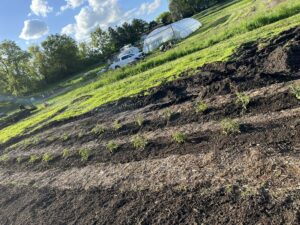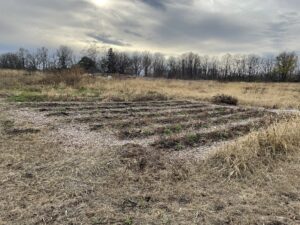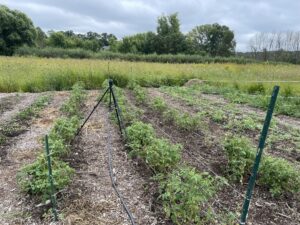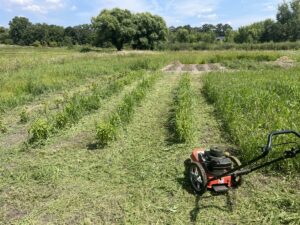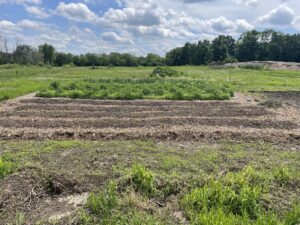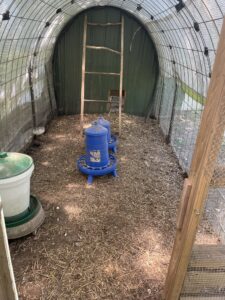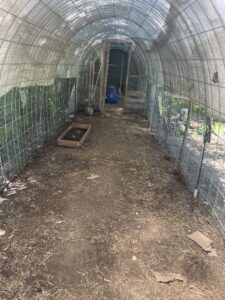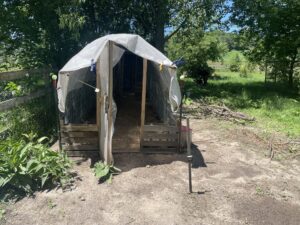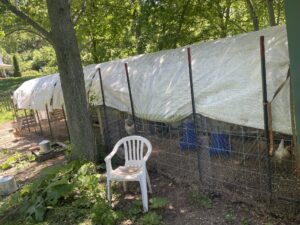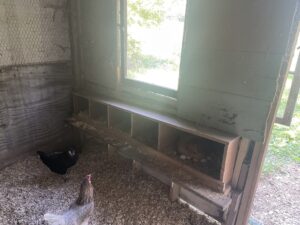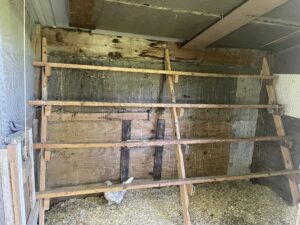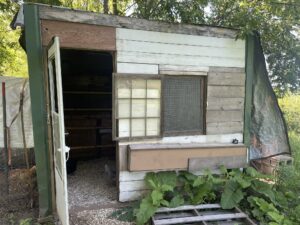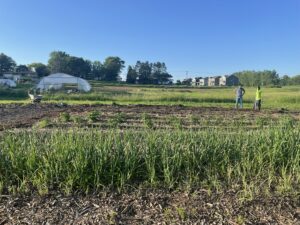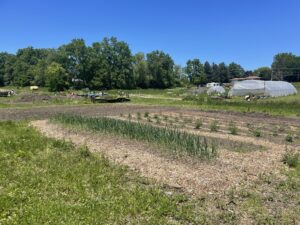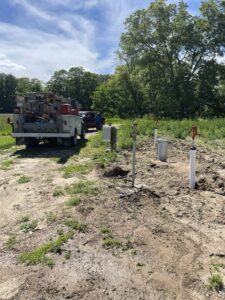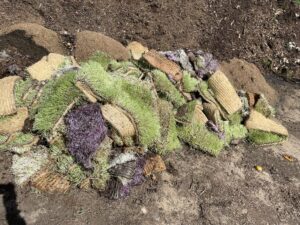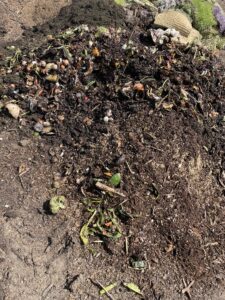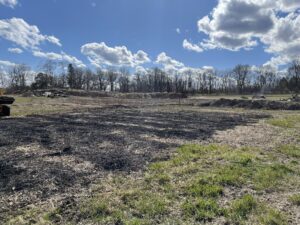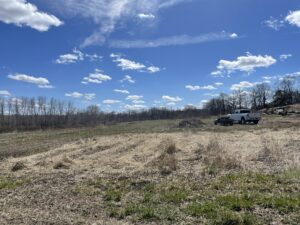Progress report for FNC24-1432
Project Information
Robert Pierce - Farm Trainer
Robert Pierce was born and raised in Madison, WI. He started his farming practice in 1983 after he noticed community members experiencing health issues tied to a nutrient-deficient diet. 40 years later, he continues to respond and supply the community’s interests through South Madison Farmers' Market, Ltd (SMFM) and Half-the-40-Acres Farm (HT40). Over the years, he has understood that while it is important to provide food for your community, it is just as important to teach people how to do it for themselves. He is passionate about training the next generation of farmers with a "show by example" approach.
Donale Richards - Project Manager, Farm Trainee
Donale was born and raised in Madison, WI. He graduated from UW-Madison in 2017 with a B.S. in Biological Systems Engineering - Natural Resources. Since college, Donale has worked a variety of project management & coordination jobs in food and agriculture which ultimately led to the formation of Madtown Food Services, LLC (MFS). While MFS currently operates as a Jamerican catering, event vending and consulting service, Donale's ultimate dream is to operate a farm-to-table restaurant while teaching as many small business owners along the way.
Alex Booker - Farm Trainee
Alex Booker was born and raised in Madison, WI. While he's worked various roles as a grower and educator in the Madison community, he had a business in mind and started Booker Botanicals in fall of 2021. In collaboration with Firm Footing Farms in Black Earth, WI, Alex was able to establish a produce growing space as well as a flock of 11 one-year-old laying hens. Alex continues to add chickens to his flock each year and now has 22 chickens. Over the years, he's become more comfortable with the brooding process, understanding dietary differences for feed and supplements, different types of watering systems, and the design process for predator protection and winterization.
There are not enough examples in Dane County for Black farmers and value-added producers to collaborate on local supply chains & market opportunities. While reading books or taking classes can help with acquiring new ways of thinking, they don’t always transfer knowledge or offer meaning-making moments while operating a business. Instead, in-person engagements tend to be preferred, especially in the Black community. People want to work with people, but often, time is limited, the distance is too far, or people are simply not connected to the right people. This is the case for three entrepreneurs who have complimentary experiences as business owners, but limited experiences working together on a project.
This project seeks to address common problem experienced by 3 entrepreneurs
- How do our food and farming businesses work together to be financially stable?
- How do we educate the Black community in Dane County about local food supply chains?
- How do we train up more Black farmers and value-added producers to support the local food supply chain?
Solution
This project focuses on training and networking with a small group of a farmers and value-added producers in Dane County. The trainer (Robert Pierce) has allocated up to 2 acres of land and limited access to equipment + vehicles for the trainees (Donale Richards and Alex Booker) to manage for their business interests. While the trainer and trainees will see each other frequently, this project will support several training sessions dedicated on small-scale production systems. The topics are focused on animal & crop planning, structural design & build, operating and maintaining farm vehicles, and post-harvest handling & processing.
What isn't covered by the training sessions will be covered by the partner visits. Yowela Farms, Artemis Provisions and Cheese, TradeRoots, Beulah Family Farms, M&J Jamaican Kitch'n, The Smiling Coast Cuisine are just a few names of partners that have worked with the collaborators in the past. Partners have been selected to conduct site visits, discuss bottlenecks in their supply chain and what steps are needed to be taken in order to work together for business-to-business opportunities. Partners with livestock will be able to show rotational grazing systems and partners in food processing will be able to show food safety techniques.
In addition, Robert manages 30+ acres of land for sustainable vegetable and grain production, large-scale composting system which supports products available at the South Madison Farmers Market and contracts with local retail stores. While this grant does not directly support those aspects at NFS, trainees will be exposed to Robert's network and have opportunities to engage in the day-to-day operations to further understand the expenses & revenue of his operation as well as the sustainable agricultural practices (composting, crop biodiversity, pest and disease management without chemical applications)
Materials and supplies that are still needed will be recycled materials from the partner network, out-of-pocket or covered by future USDA grant or cost-share programs (BFRDP, UAIP, EQIP, etc.) to support the collaboration. Lastly, the trainees will collect online materials/resources from USDA service centers, Farmers.gov, FarmAnswers and the SARE Project Database.
Objectives
- Host 16 hands-on training sessions and partner visits that focus on sustainable chicken and vegetable production systems
- Host 2 workshops at the annual Black Urban Growers Conference to share updates on project & resources collected
- Host 2 on-farm demonstrations for the public to learn about the project's production system + supply chain
- Curated compilation of resources to be shared on the Calabash Collective's online learning platform (a national network of Black/Brown farmers, growers, food producers and consultants)
Cooperators
- - Producer
- - Producer
Research
There was no farm research conducted during the 2024 season
There was no farm research conducted during the 2025 season
There are no results from the soil test to share at this time.
Educational & Outreach Activities
Participation summary:
Curricula, factsheets or educational tools
- On-going development of 1 pagers regarding observations+tips made by trainees during the 2024 & 2025 season
- Once in final format, 1-pagers will be placed on padlet page
- Further exposed to members of the Calabash Network and general public
On-farm Demonstrations
- In coordination with UW-Madison’s PEOPLE program, the trainees hosted one, 90-minute session for 15 high school students (+3 program staff)
- Visitors were given a tour of the farm, learning about raised bed system (composting+mulch), bio diversity (plant varieties+insects), infrastructure (roadways, waterways, well, electric, high tunnel & hoop house), and day-to-day management
- There were opportunities for hands-on engagement by shoveling compacted soil vs composted soil, harvesting onions, and identifying animal tracks (deer, turkey, variety of rodents) in the demonstration plot
Tours
- Yowela Farms (YF)
- Trainer+trainees spent time with the owner and farmworker to discuss the set up for a small-scale chicken production farm, including design considerations for incubating chicks, the brooder for layers, as well as an hand-pulled vs tractor pulled run/coop
- Trainees have taken notes (tips) for this visit and will be included in a one-pager to be shared on the padlet page
- As a result of this visit, the host, trainer and trainees will continue exploring a business partnership & future funding opportunities that would support long-term investments on infrastructure, transportation, and food safety for both farm sites, thus allowing to share/lower costs on big ticket items.
- Firm Footing Farm (FFF)
- Trainer+trainees spent time with the owner and farmworker to discuss the set up for a small-scale chicken production farm, including design considerations for the brooder for layers, as well as the semi-permanent run/coop
- Trainees have taken notes (tips) from this visit and will be included in a one-pager to be shared on the padlet page
- M&J Jamaican Kitch’n (M&J)
- Trainer+trainees spent time with the owners (2) to see how the commercial kitchen space is set up and how the food cart and catering service operates at different scales of production
- As a result of this visit, there will be continued discussions on a longer-term partnership:
- M&J being a vendor at the South Madison Farmers’ Market
- M&J sourcing ingredients from the demonstration plot in order to develop more locally-sourced food products (test run in 2025)
- Collaborating on a Value-added Producer Grant proposal and/or Buy Local, Buy Wisconsin Grant proposal, specifically for the development of bottled jerk sauce
- Mango Man Cooks (MMC)
- Trainer+trainees spent time with the owner to see how their commercial kitchen space is set up and how the food cart and sauce production line operates at different scales of production
- As a result of this visit, there will be continued discussions on a longer-term partnership:
- MMC sourcing ingredients from the demonstration plot in order to develop more locally-sourced food products (test run in 2025)
- Collaborating on a Value-added Producer Grant proposal and/or Buy Local, Buy Wisconsin Grant proposal, specifically for the development of two existing sauces (currently found in local grocery stores)
Workshop / field days
- Trainer and trainees were involved in 4 full-day sessions during the 2024 season
- The first session focused on site planning including total size of plot, clearing weeds & old vegetation, orientation of row crops and walkways, and seed selection. In addition, the group mapped out best location on the land for managing chickens (primarily layers)
- The second session focused on the composting system. Trainees collected food scraps from local food businesses, used a skidster to mix existing mounds and to create raised beds in demonstration plot.
- The third session involved a site visit with staff from the Dane County Natural Resource Conservation Service. As a group, we surveyed the land in order to develop a conservation plan. After the grow season, the trainer officially enrolled in the EQIP program to financially assist the implementation of a second high tunnel with irrigation, as well as an access road for farm vehicles.
- The fourth session involved a contractor from Sauk Plains who installed a well on the property. During the session, trainees learned how the well was installed, how to operate the pumps and electrical panel, and ways to different ways to irrigate the demonstration plot (hand held wands vs sprinkler system)
- Two beginning farmers volunteered time with the trainees to manage the demonstration plot throughout the 2024 season (total of 10 sessions)
- Sessions typically lasted 2-4 hours in duration
- Promoted via word-of-mouth
Learning Outcomes
What was learned in the project and how did it affect farm or ranch operation?
- Trainer+Trainees learned about a variety of resources from NRCS that would benefit chicken and vegetable production.The list includes:
- Environmental Qualities Incentive Program (application submitted 11/27/24)
- Compost facility (will explore application in the future)
- Cover crops (will explore application in the future)
- Conducting a conservation plan and a nutrient management plan will open up additional cost-share opportunities for livestock grazing operations
- Trainees learned steps to register a farm number with the Farm Service Agency. One of which will consider applying in 2025 for the demonstration plot
- Trainees are finding that work-share opportunities are the best way to gain more knowledge on food and agricultural business operations. This has made it easier to put things into practice and experience the challenges without a heavy financial risk.
Did you overcome your identified barrier, and if so, how?
- Business-to-business opportunities are still a challenge to strengthen within the Black/brown community, however:
- Two food businesses are open to exploring a farm-to-table / local sourcing project using produce from the demonstration plot
- One farm partner has expressed interest in joining with the Trainer+Trainees to share costs & equipment to operationalize a small-scale chicken production. While this might not be achieved during the term of the project, both farm sites are taking the steps to invest in semi-permanent infrastructure and vehicles that would be used long-term
- In terms of educating the Black/brown community about local food supply chains, the Trainer+Trainees continue to see individuals who come out to the farm for work or to volunteer and gain more insight on how farming really works
- In terms of training up more Black farmers and value-added producers, that will take time and will rely on the individual’s interest and passion. But we have one individual (volunteer) who has helped out in the demonstration plot and now takes interest in helping out more frequently on the farm and is building a passion for making bread from scratch.
What are the advantages and disadvantages or implementing a project such as yours?
- Advantages: the Trainer+Trainees have mutual respect for one another and the role we play in the Black/Brown community
- Disadvantages: we are all very busy and are at different stages in life. While we have a passion for food and agriculture, there are always challenges to face when it comes to balancing work, family obligations, and staying healthy mentally and physically.
What would you tell other farmers or ranchers?
- Start getting to know people in your immediate community and ask simple questions like what food do you like to eat, where you do you shop for food, do you grow any food, do you cook something special for yourself/family.
- If you’re trying to partner with others, research news articles, Youtube videos or ask your local community organizations for recommendations. There are a lot of people doing really cool work, but sometimes its not as visible or easy to find. It may require you to visit people where they are at and plan for extra time to get to know them before forming a partnership!
